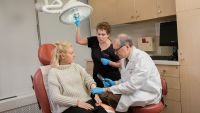Acne
Make an Appointment
Our team is here to help you make an appointment with the specialists that you need.

Acne is one of the most common skin conditions in the United States, affecting millions of people of all ages. Acne is most common among teenagers but can affect younger children and adults as well. Acne blemishes usually appear in areas of the body that have the most oil glands, including the face, chest, neck, back and shoulders. It can be very persistent, and proper treatment can help prevent lasting effects such as scarring and emotional distress.
Acne breakouts happen when dead skin cells and oil clog the hair follicles, or pores, of the skin. Hair follicles are attached to oil glands, and the oil, called sebum, usually travels up the hair shaft to lubricate the skin. When the pore becomes clogged with oil and dead skin cells, acne results. The follicle wall may bulge and produce a whitehead or may become blocked with bacteria and oil that is exposed to the air, causing a blackhead. Bacteria can thrive in this environment, causing redness and inflammation.
Personal Treatment for Your Acne
Each case of acne is different. At ColumbiaDoctors, our dermatologists will help you develop a treatment plan based on your particular symptoms as well as your lifestyle and other medications you may be taking. Acne can be challenging to eliminate on your own with over-the-counter medications. Our board-certified dermatologists have extensive experience with this condition along with access to the full range of treatment options. We will help you find the most effective therapy for your skin. Fortunately, there are many treatment options available today. With the right approach, you can control or eliminate your acne and prevent scarring and lasting damage to your skin.
Topical Medications for Acne
Topical treatments are medication that are applied directly to the skin. They can be over-the-counter creams or prescription medications.
- Over-the-counter creams commonly include salicylic acid or benzoyl peroxide. These two ingredients work in different ways, and sometimes can be used together. Your dermatologist will evaluate your symptoms and recommend the best treatment for your skin.
- Prescription treatments for acne include topical retinoids and antibiotic creams. Topical retinoids are made from vitamin A and keep pores clear by preventing oil buildup. They have some possible side effects which include sunlight sensitivity and irritation and should be used as instructed by your dermatologist. Topical retinoids can be very effective in treating acne. Antibiotic creams treat bacterial infection and therefore are often used in combination with other topical treatments that clear pores.
Oral Medications for Acne
Oral medications are generally prescribed when your acne persists after topical treatments have been tried. Oral medications fight bacterial infection or address hormonal changes that cause acne breakout.
Your dermatologist may prescribe one of the following:
- Antibiotics help to kill bacteria and reduce inflammation.
- Birth control pills contain the hormone estrogen. These can be helpful for women who experience breakouts related to their menstrual cycle, or who are in the early stages of menopause.
- Isotretinoin can help with the most severe cases of acne. Isotretinoin is a powerful and effective oral retinoid which has some potentially serious side effects. Your dermatologist will closely monitor your use of this medication.
Procedures and Therapies
There are several therapies for acne that your dermatologist may recommend, either alone or in combination with medication. They are all in-office procedures.
- Lasers and light therapies use high energy light sources to target and reduce bacteria.
- Chemical peels use a solution – usually made from concentrated glycolic acid – to remove, or exfoliate, layers of skin cells. Removing skin can help clear acne and stimulate the growth of new skin. Chemical peels can be effective with whiteheads, blackheads, and papules and are often used in combination with other medications.
- Extraction involves the removal of whiteheads or blackheads with special, sterilized tools. Your dermatologist may use extraction on cysts that haven't responded to topical medication, or before another treatment method.
- Steroid injections can be used to quickly target large and painful blemishes by injecting medication directly into them. Steroid injections can improve appearance immediately.
Expert Treatment for Acne Scarring
Acne can leave lasting scars on your skin. ColumbiaDoctors dermatologists offer many treatment options for people who wish to treat their acne scars, including soft tissue fillers, laser resurfacing treatments, chemical peels, dermabrasion, and surgery. Your dermatologist will discuss your options with you and help you develop a plan that works best for your skin. Many procedures can take place in your physician's office.
Locations
Herbert Irving Pavilion, 12th Floor
161 Fort Washington Avenue
New York, NY 10032
ColumbiaDoctors Midtown
51 West 51st Street, Suite 390
New York, NY 10019
ColumbiaDoctors Third Avenue Office
880 Third Avenue, 3rd Floor
New York, NY 10022